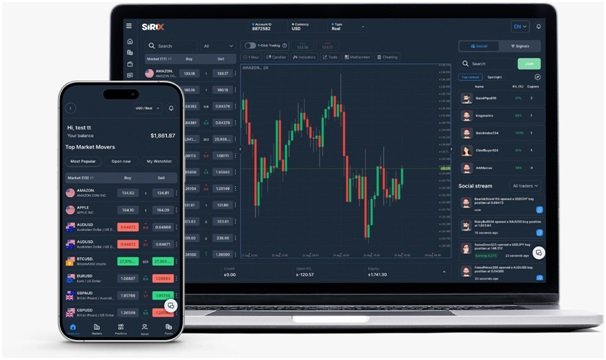Trading platforms in Forex are the nerve centers where traders access real-time market data, employ analytical tools, and execute orders swiftly. Consider the staggering numbers: The Forex market alone boasts a daily trading volume exceeding $6 trillion, underscoring the pivotal role that trading platforms play in the global financial landscape.
In Forex, precision and timing are everything. A delay of just a few seconds in executing a trade can lead to substantial profit losses or missed opportunities. Leverate is a trusted provider of white-label solutions for brokers and trading platforms, which provides the tools and connectivity necessary for traders to participate in this fast-paced environment with confidence.
From this guide, you will understand their definitions, examples, and features, it becomes increasingly apparent that they are not mere technological innovations. They are the lifeblood of Forex trading, empowering traders and brokers alike to actively engage in the world’s largest and most liquid financial market, where fortunes are made and strategies are executed with the click of a button.
What Is a Trading Platform?
A Trading Platform is a digital interface that enables individuals and institutions to participate in financial markets, including stocks, commodities, and currencies. It acts as a gateway for traders to access real-time market data, execute orders, and manage their investment portfolios. Trading platforms come in various forms, from desktop applications to web-based platforms and mobile apps, catering to the diverse needs of traders.
In essence, a Trading Platform is the virtual arena where traders make critical financial decisions. It plays a central role in democratizing access to financial markets, enabling traders of all levels of experience to participate in the dynamic world of trading and investment.
Understanding Trading Platforms
Types of Trading Platforms
These different platform types offer flexibility and convenience, enabling traders to choose the platform that best suits their trading style.
Desktop Platforms: They are feature-rich and offer advanced tools and customization options. They are ideal for experienced traders who require in-depth analysis and quick execution. These platforms provide a comprehensive view of the market, with multiple windows for charts, news feeds, and order execution.
Web-Based Platforms: They offer the advantage of mobility, allowing traders to access their accounts and execute trades from virtually anywhere. These platforms are user-friendly and often have a simplified interface suitable for traders of all levels.
Mobile Apps: Traders can stay connected to the markets and execute trades while on the go. These apps are designed for smartphones and tablets, offering a streamlined trading experience with intuitive interfaces and real-time data.
Specialized Platforms: Some trading platforms cater to specific trading niches, such as cryptocurrency or options trading. These specialized platforms offer unique features and tools tailored to the needs of traders in those markets.
Proprietary Platforms: These platforms are exclusive to the broker’s clients and are designed to integrate seamlessly with the broker’s services. While they may not have the same level of recognition as widely-used platforms, they can offer unique advantages and features.
What Is Relationship Between Trading Platform and Broker?
Brokers act as intermediaries, facilitating access to financial markets through their trading platforms. Traders rely on brokers to provide a stable and secure platform for executing trades, while brokers depend on trading platforms to offer competitive services to their clients. This partnership is critical in ensuring seamless market access, efficient trade execution, and a positive trading experience.
Example of A Trading Platform
MetaTrader 4 (MT4) is a highly efficient and widely recognized trading platform with over 200,000 active servers worldwide and millions of traders benefiting from its user-friendly interface, advanced charting tools, and support for algorithmic trading. It empowers traders with a comprehensive range of timeframes, customizable charts, and various technical indicators for in-depth analysis. This extensive toolset allows traders to make informed decisions based on data and trends.
Additionally, MT4 fosters a thriving trading community where traders can share ideas, access custom indicators, and explore a vast marketplace of trading tools, further solidifying its reputation as an efficient and effective platform for traders of all levels. Leverate is a leading MT4 provider and ready to empower your brokerage goals with their exceptional MT4 offerings.
Features of Trading Platforms
User Interface
User Interface serves as the gateway for traders to interact with the markets. A well-designed user interface is intuitive and user-friendly, ensuring that traders can navigate the platform effortlessly. Features like customizable layouts, one-click trading, and drag-and-drop functionalities streamline the trading process. Clear and concise visuals, coupled with responsive design, contribute to a seamless trading experience, irrespective of the trader’s device.
Security
Traders entrust platforms with their sensitive personal and financial information. Robust security measures, including data encryption, multi-factor authentication, and firewalls, safeguard this information from unauthorized access. Regular security audits and updates are vital to stay ahead of evolving cybersecurity threats. A secure trading platform instills confidence in traders, assuring them that their assets and data are protected.
Data Analysis Tools
Data analysis tools are the backbone of a trading platform. They empower traders to make informed decisions based on market data. Advanced charting capabilities with multiple timeframes, technical indicators, and drawing tools enable in-depth technical analysis. Real-time market news feeds and economic calendars keep traders updated on events that may impact their positions. Additionally, risk management tools, such as stop-loss and take-profit orders, provide control over trades.
Trading Tools of a Broker
The trading tools offered by a broker within the trading platform can greatly influence a trader’s success. These tools may include educational resources, market research, economic analysis, and sentiment indicators. Brokers may also offer unique order types, such as trailing stops or guaranteed stop-loss orders, enhancing risk management capabilities. A comprehensive suite of trading tools adds value to the trader-broker relationship, helping traders make better-informed decisions.
How to Choose a Trading Platform for Beginning Traders?
For novice traders venturing into the world of financial markets, selecting the right trading platform is a critical first step. Here are key considerations to make an informed choice:
User-Friendly Interface: Look for platforms that offer straightforward navigation, clear charting tools, and easy order execution. It minimizes the learning curve and allows newcomers to focus on learning the essentials of trading.
Educational Resources: These may include tutorials, webinars, and educational content. A platform with comprehensive learning materials can help beginners build a solid foundation and develop trading skills.
Demo Accounts: Many platforms offer demo accounts, allowing beginners to practice trading with virtual funds. This hands-on experience helps new traders understand how the platform works and test their strategies without risking real money.
Asset Availability: Ensure the platform offers a range of assets that align with your trading interests. For example, if you intend to trade forex, check if the platform provides a variety of currency pairs. Diversification opportunities are crucial for beginners.
Customer Support: Look for platforms with responsive customer support through various channels like live chat, email, or phone.
Security: Prioritize platforms with robust security measures. Check for encryption protocols, data protection, and regulatory compliance.
Cost and Fees: Some platforms offer commission-free trading but may charge spreads or overnight fees. Evaluate how these costs align with your trading strategy and budget.
Compatibility: Ensure it works seamlessly on your preferred operating systems (Windows, macOS, mobile) to trade comfortably from your chosen devices.
Reviews and Reputation: Research reviews and the platform’s reputation within the trading community. Feedback from experienced traders can provide valuable insights into the platform’s reliability and performance.
Regulation: Verify if the platform is regulated by relevant financial authorities. Regulation adds an extra layer of security and transparency to your trading experience.
By carefully assessing these factors, beginning traders can make an informed choice when selecting a trading platform that suits their needs, facilitates their learning journey, and lays the foundation for a successful trading career.
A robust Trading Platform is the linchpin for success in Forex trading. Serving as the digital gateway to global markets, these platforms offer real-time data, advanced analysis tools, and seamless order execution. They empower traders to make split-second decisions, leveraging the volatility of currency markets. A reliable Trading Platform isn’t just a tool; it’s the foundation upon which lucrative trades and strategic decisions are built.








